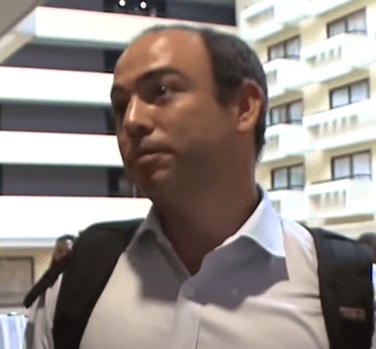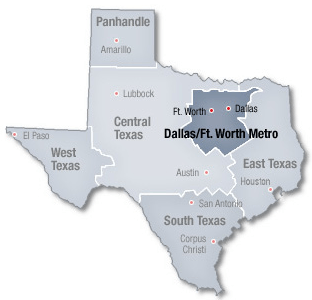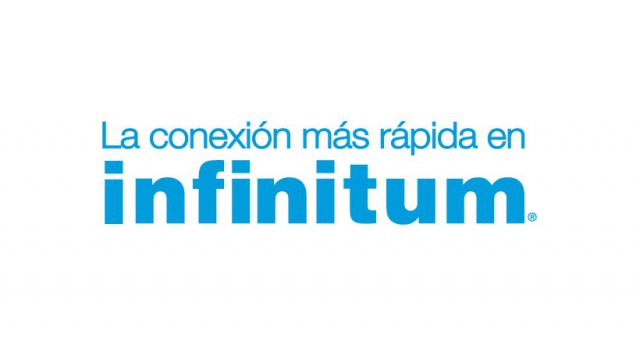
Chatham County Sheriff’s Deputy O’Berry ejects a WXIA-TV news crew from a Savannah, Ga. hotel room at the direction of a senior official of the American Legislative Exchange Council. (Image: WXIA-TV)
When an Atlanta news crew from WXIA-TV asked questions about a closed-door meeting involving Georgia lawmakers, wireless industry lobbyists, and the American Legislative Exchange Council, Bill Meierling, vice president of communications for ALEC, directed four armed sheriff’s deputies to kick the news crew out of their hotel rooms and escort them to the street.
“I am a guest of the hotel, sir,” WXIA reporter Brendan Keefe told Chatham County sheriff’s deputy A. O’Berry.
“Not for long, we’ll take care of that,” responded O’Berry.
“Are we violating a law here?” Keefe asked another deputy who told them to gather their belongings.
“Don’t say nothing,” O’Berry told the other deputy.
“To protect Republicans and serve giant corporations,” said Atlanta resident Larry Jefferson, who tipped us off. “To watch a hack from ALEC wave his arm and see armed deputies throw a reporter who paid for his room out of a hotel for just asking questions should wake up every American about where this country has gone.”
In a resort hotel in Savannah, the newest crop of bills likely to end up before Georgia lawmakers are being written by corporate lobbyists for introduction by friendly legislators willing to do their bidding.
At ALEC’s Communications & Technology Task Force Luncheon, Keefe spotted Rep. Ben Harmon hobnobbing with a lobbyist for CTIA, the giant wireless lobby. When he approached Harmon, Keefe was pulled out of the room. He soon found Meierling in the lobby being watched over by four off duty Chatham County deputies paid to protect ALEC’s event.
“Turn off the camera,” Meierling demanded.
 When Keefe refused, Meierling told him he was going to have him thrown out of the hotel.
When Keefe refused, Meierling told him he was going to have him thrown out of the hotel.
Keefe persisted and asked who was paying for the legislators to attend. “Lobbyists?” Keefe asked.
“No,” Meierling replied.
Unfortunately for Meierling, looser lips from an unidentified New England legislator and two lobbyists in the hotel bar the night before suggested otherwise. One lobbyist admitted she paid a higher fee to be there to help subsidize legislators’ travel expenses.

Meierling
When confronted with that information, Meierling sighed deeply and waved over the officers to do their duty… to ALEC.
“I’m going to have to ask you to leave,” Deputy O’Berry immediately demanded as he walked up to the reporter. He was uninterested in the fact Keefe was a paid guest at the hotel. Keefe and WXIA had to go, to protect the interests and the secrecy of a group that is responsible for writing many state laws across the country.
“It’s a corporate bill mill,” said former ALEC member Sen. Nan Orreck. “The truth be told, they write the bills.”
“There are votes taken that have the corporate folks at the same table voting with the legislators on what bills to pick and that at its core just screams out inappropriate,” Orreck said. She left the group.
For the convenience of legislators, ALEC model bills come to their desks already written. All a legislator has to do is fill in the name of his or her state on a blank line and the bill is ready for introduction. To help educate lawmakers about the hot button issues bothering America’s largest corporations, ALEC’s legislative members — almost all Republicans — are paid “scholarships” in the thousands of dollars to attend resort meetings.
David Ralston, the speaker of the Georgia House of Representatives, even penned a fundraising letter on ALEC letterhead looking for $5,000 contributions to send fellow lawmakers to ALEC’s annual meetings.
“O’Berry and those other deputies should be suspended, fired, and then thrown in jail for dereliction of duty,” Jefferson believes. “These deputies either don’t know or don’t care about the law, something O’Berry was well aware of when he told another deputy to keep his mouth shut.”
“ALEC exists to subvert our democracy and any identified member of this group in public office should no longer be there.”
[flv]http://www.phillipdampier.com/video/WXIA Atlanta ALEC – The Backroom Where Laws Are Born 5-20-15.mp4[/flv]
WXIA-TV in Atlanta introduces viewers to the American Legislative Exchange Council, a group that can summon sheriff’s deputies to toss a reporter out of a hotel where he was a paid guest just for asking too many embarrassing questions. (6:31)


 Subscribe
Subscribe Time Warner Cable is launching a new network of outdoor hotspots in the Dallas Metroplex, giving their customers free unlimited access at popular outdoor destinations and retail stores.
Time Warner Cable is launching a new network of outdoor hotspots in the Dallas Metroplex, giving their customers free unlimited access at popular outdoor destinations and retail stores. But Time Warner Cable customers elsewhere will also find a quickly growing network of indoor hotspots hosted by businesses that subscribe to Time Warner’s commercial broadband service. As part of their broadband package, businesses are encouraged to host TWC Wi-Fi Passpoint access, which allows TWC customers to automatically connect to any participating Wi-Fi hotspot without having to ask the business for a password.
But Time Warner Cable customers elsewhere will also find a quickly growing network of indoor hotspots hosted by businesses that subscribe to Time Warner’s commercial broadband service. As part of their broadband package, businesses are encouraged to host TWC Wi-Fi Passpoint access, which allows TWC customers to automatically connect to any participating Wi-Fi hotspot without having to ask the business for a password.


 AT&T and Verizon Wireless are ditching subsidies for the popular (and expensive) Apple iPhone in favor of straight installment payment plans.
AT&T and Verizon Wireless are ditching subsidies for the popular (and expensive) Apple iPhone in favor of straight installment payment plans. Verizon Wireless is also planning to drop its two-year subsidy programs, perhaps entirely across all devices, as early as the end of this summer. That will force Verizon Wireless customers onto the Edge installment payment program unless they are willing to pay for a device upfront.
Verizon Wireless is also planning to drop its two-year subsidy programs, perhaps entirely across all devices, as early as the end of this summer. That will force Verizon Wireless customers onto the Edge installment payment program unless they are willing to pay for a device upfront. With AT&T’s arrival in the Mexican wireless marketplace with its purchase of Iusacell and Nextel, América Móvil is responding with
With AT&T’s arrival in the Mexican wireless marketplace with its purchase of Iusacell and Nextel, América Móvil is responding with 